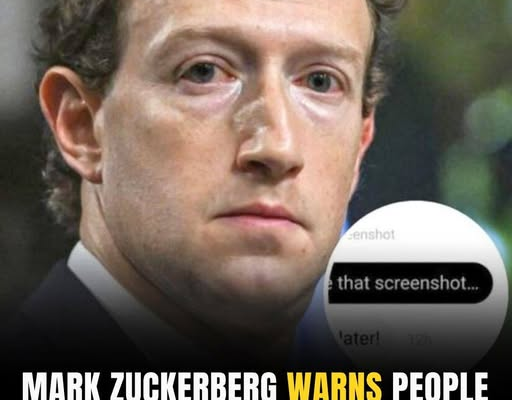Mark Zuckerberg Warns Against Taking Screenshots on Facebook Messenger

In a move that has sparked heated discussion around online privacy and digital etiquette, Mark Zuckerberg, CEO of Facebook (now Meta), recently issued a strong warning to users about taking screenshots in Messenger chats—particularly in end-to-end encrypted conversations. According to Zuckerberg, the latest update will notify users if someone captures a screenshot of a disappearing message, effectively mirroring similar privacy features already popular on apps like Snapchat.
This announcement, first shared in January 2022, coincided with Messenger’s rollout of disappearing messages. This feature allows users to send messages that vanish shortly after being read, adding an extra layer of privacy for those who want to have more intimate or sensitive conversations without leaving a permanent record. By integrating screenshot notifications, Facebook aims to reinforce trust and provide greater transparency between conversation participants.
Initially, the feature has been made available to Facebook users in the U.S., with plans to expand to Europe and eventually other regions. Instagram, which also belongs to Meta, is expected to follow suit with similar privacy-focused updates in response to ongoing security concerns and user demand for better control over their digital interactions.
Despite these efforts to improve privacy, many users have already highlighted potential workarounds that could undermine the purpose of the feature. Some suggest using screen recording tools instead of direct screenshots, photographing the screen with another device, or even disabling Wi-Fi to capture messages undetected. These loopholes underline the persistent challenge tech companies face: designing features that effectively protect privacy while accounting for unpredictable user behavior.
Reactions to Zuckerberg’s announcement have been mixed and passionate. The original post quickly went viral, generating more than 94,000 comments and sparking countless threads across social media. Many praised the move, seeing it as a necessary step toward fostering safer online communication. In a time when privacy breaches and data leaks are headline news, such measures can help rebuild trust in digital platforms.
However, not everyone was impressed. A significant number of users voiced frustration, arguing that tech giants should focus on tackling broader, more critical issues—such as data security, misinformation, and fostering real-world human connections—rather than adding what some see as cosmetic updates to chat apps. One commenter lamented, “Instead of focusing on these small digital features, why not invest more in encouraging genuine, face-to-face connections and reducing screen addiction?”
Others took a more humorous approach, joking about how these new updates might expose sneaky habits or lead to awkward confrontations among friends and partners. Memes and satirical posts flooded Twitter and Instagram, turning Zuckerberg’s announcement into a viral moment of internet comedy.
Ultimately, this update reflects a larger trend in the tech world: an ongoing struggle to balance user privacy with freedom of expression and user autonomy. It also highlights the cultural shift in how people value privacy in the digital age. While some embrace the changes as empowering, others see them as intrusive or even performative.
As this feature rolls out more broadly, it will be interesting to watch how it shapes online behavior. Will it deter people from taking screenshots altogether, or simply encourage new creative ways to circumvent the notification? Will it lead to more respectful interactions, or create new tensions among users?
What do you think about this controversial update? Is it a much-needed step toward digital privacy, or an unnecessary intrusion into how we share and save our conversations? Perhaps it’s time to reconsider how much privacy we can truly expect online—or if we should shift our focus toward nurturing more authentic, offline connections instead.
Whatever your opinion, this discussion is an opportunity to reflect on our evolving relationship with technology and the ongoing challenge of protecting privacy in an increasingly connected world. Share your thoughts below, and don’t forget to discuss it with friends and family—just maybe not in a disappearing message.



